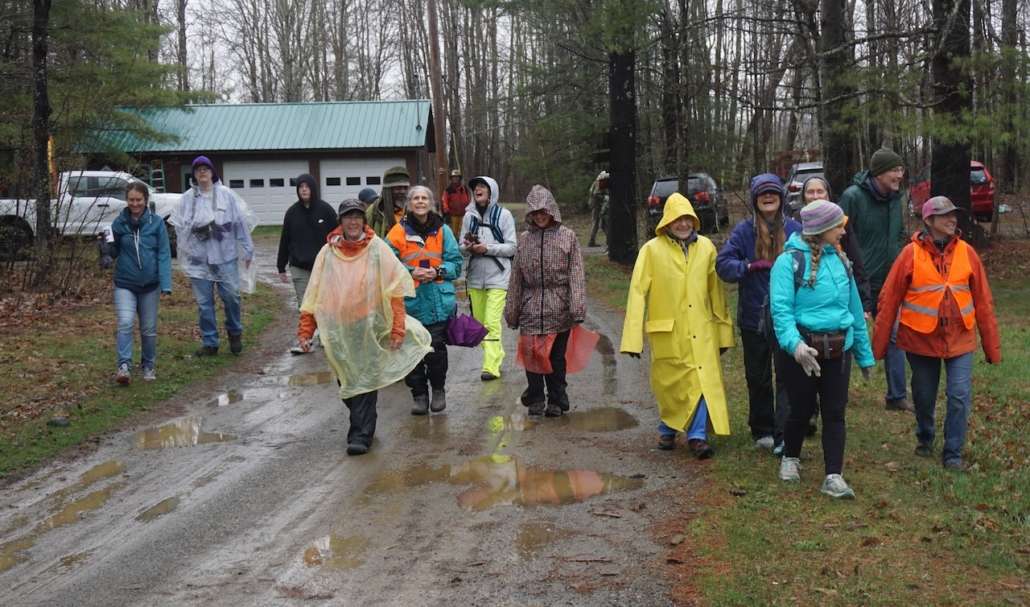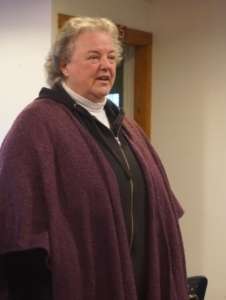
Kennebec County Courthouse
While looking for information for the previous articles on Maine’s legal and court systems and people who made them work, your writer came across related information that falls under two headings, people and buildings.
The limited research this series rests on found bits and pieces of information about some items. Others remain obscure; any reader who can contribute is invited to email The Town Line, townline@townline.org.
This article will share your writer’s findings about a few people, specifically lawyers, hoping readers find them interesting.
William Mathews, author in 1885 of one of the articles cited, called medicine and the law two professions that are “indispensable to society,” and also the two that are most frequently ridiculed.
The law, he claimed, has one “advantage over all other business callings: that eminence in it is always a test of ability and acquirement.”
Any other professional can fake it, he opined, and gain “wealth and honor” by “quackery and pretension.” A lawyer earns a reputation only by “rare natural powers aided by profound learning and varied experience in trying causes,” because both fellow lawyers and judges are constantly alert for any shortcut, omission, misstatement or other error, purposeful or accidental.
* * * * * *
James Bradbury’s history of the Kennebec bar, in Henry Kingsbury’s 1892 Kennebec County history, named many Augusta and Waterville lawyers and a few from smaller towns. The latter group included from Winslow, James Child and Thomas Rice; Lemuel Paine (and Bradbury mentioned Lemuel’s son Henry Paine, who was a lawyer, but not in Winslow); and George Warren.
In his chapter on Winslow in the history, Kingsbury named Rice and the Paines. He added Paine’s partner, “General Ripley, afterward the hero of the battle of Lundy’s Lane, Canada.”
Bradbury said Thomas Rice was the first lawyer in Winslow, settling there in 1795. Kingsbury said Winslow’s first lawyer was George Warren, “who came before 1791.” Rev. Edwin Whittemore, in his 1902 Waterville centennial history, agreed with Kingsbury (or perhaps just took Kingsbury’s word as truth).
* * * * * *
Thomas Rice was born in Pownalborough (according to Wikipedia), on March 30, 1763, Bradbury wrote; most other sources say March 30, 1768. Kingsbury listed “Esquire Thomas Rice” among early settlers along the Kennebec south of the mouth of the Sebasticook.
Bradbury said Rice graduated from Harvard in 1791 and read law under Timothy Bigelow (no dates or location provided; probably in Massachusetts, because Wikipedia says he was admitted to the bar in Suffolk County, Massachusetts, in 1794; and another Wikipedia article [on General Eleazer Wheelock Ripley], names Timothy Bigelow as Massachusetts House speaker in 1813). Rice opened his Winslow, Maine, practice in 1795.
According to Aaron Plaisted’s chapter on Waterville’s early settlers in Whittemore’s history, the first lawyer in that town (now city) was Reuben Kidder, who arrived in the spring of 1775. “He arrived four days before Thomas Rice, who, disappointed in having been anticipated, went to the east [Winslow] side of the river where he passed a long and useful life.”
Find a Grave says Rice married Sarah Swan (born May 6, 1777) on Oct. 22, 1796.
Rice had made a name for himself by 1801, when, on Dec. 18, he was elected one of five commissioners to petition the Massachusetts legislature to set off the west side of the Kennebec as a separate town (the legislature approved on June 23, 1802). Kingsbury said he served his adopted town as a selectman in 1802, and as treasurer in 1803, from 1810 through 1812 and again in 1830.
In 1807, Wikipedia says, the (District of) Maine supreme court appointed Rice one of Kennebec County’s examiners of counselors and attorneys. In 1814, he was elected to the Massachusetts House of Representatives; from 1815 to early 1819, he served in the U.S. House of Representatives. Failing to win a third term in the fall of 1818, he went back to practicing law.
Rice was one of the area lawyers Bradbury met after he opened his Augusta office in 1830.
Sarah died Sept. 26, 1840. On Feb. 16, 1841, in Winslow, Rice married Susanna (Susannah, Susan) Greene. They had one son, Thomas III, born in 1843 or March 4, 1844 (sources differ).
Rice died on Aug. 25, 1854, in Winslow, and is buried in Waterville’s Pine Grove cemetery, with first wife Sarah; second wife Susanna, who died Dec. 1, 1879; and son Thomas III, identified as Lieutenant Thomas Green Rice.
Thomas III enlisted for Civil War service in November 1863, Find a Grave says, joining the 2nd Maine Cavalry, Company B. He was a second lieutenant in Company D, 4th United States Colored Cavalry, when he died of a fever on Oct. 4, 1865, in Vidalia, Mississippi (according to Find a Grave; your writer finds no contemporary town named Vidalia in Mississippi, though there is one in Louisiana and one in Georgia).
* * * * * *
George Warren, according to Bradbury, was a son of General James and Mercy (Otis) Warren, leading Massachusetts patriots before and during the Revolution. James Warren, Wikipedia says, earned his title both as Paymaster-General of the Continental Army (July 27, 1775, to April 19, 1776) and as a major-general of the Massachusetts militia.
George was the youngest of the five Warren sons. The Geni website says he was born Sept. 20, 1766, in Plymouth, Massachusetts.
Whittemore cited Warren opening his legal business by 1791 as an example of Winslow’s development, along with population growth, mills, fisheries and productive farms.
Bradbury called Warren “one of the lesser lights of the Kennebec bar, which was extinguished before the opening of the present [19th] century.” He credited Warren with “fine natural talents,” but said he “led a dissipated life, dying at Augusta in penury” after practicing briefly in Winslow.
Bradbury gave no dates. Geni says he died in 1800 (February 1800, according to another website) in Maine.
* * * * * *
James Loring Child, Bradbury wrote, was born May 31, 1792, in Augusta. He attended Hallowell Academy, studied law with two different two-man firms and was admitted to the bar in 1813. His first four years in practice were in Winslow in partnership with Rice, who was his senior by more than a generation.
Child had an Augusta practice from 1818 to 1822 and lived there for 30 years. He died in 1862.
The FamilySearch website summarizes the life of James Loring Child, born May 31, 1792, in Lincoln, Maine, and died on Aug. 10, 1862, in Augusta. He married Jane Hale (born Jan. 12, 1804, in Bradford, Massachusetts) on Nov. 10, 1822, in Portland; and was an Alna resident in 1830 (before returning to Augusta?). He and Jane had five sons and five daughters between Oct. 27, 1823 (when oldest son, Daniel Carleton, was born in Alna), and Jan. 15, 1846 (when youngest son, Robert Wainwright, was born in Augusta).
In Whittemore’s Waterville history, James L. Child, from Winslow, is listed as captain of a militia company that served briefly during the War of 1812.
None of these sources, except Bradbury, says anything about Child’s profession.
James Loring Child died Aug. 10, 1862; Jane died Dec. 14, 1873. Both are buried in Augusta’s Forest Grove cemetery, with all five of their sons and the two daughters who died in infancy (and three generations of other Childs).
In the Maine state archives index on line, under Executive Council papers, are references from the spring of 1822 to James L. Child’s role as Secretary of the Board of Commissioners Under the Act of Separation. Intermixed are references to James A. Child, including in titles of documents listed under James L. Child, leaving your writer more confused than usual.
* * * * * *
Lemuel Paine (often called Jr.), was born Dec. 2, 1758, Find a Grave says, supported by the barely readable photo of his tombstone on the website. FamilySearch lists his birthdate, probably erroneously or conflated with another Lemuel Paine, as Dec. 2, 1777.
His birthplace is given as Foxborough, Massachusetts, where, on Sept. 30, 1805, he married Jane Thompson (or Thomson) Warren, born Aug. 20, 1778. WikiTree agrees with this information in its Paine biography; on another page, the site dates the marriage Nov. 28, 1805, and says it was in Winslow.
The WikiTree biography says Paine graduated from Brown University in 1803, studied law with David Gilbert in Mansfield (Massachusetts, about seven miles from Foxborough), and “was admitted to the bar in due course.” He and Jane moved to Winslow (no reason or date given).
WikiTree says Paine was in the Massachusetts legislature in 1810. He was apparently not representing Winslow; the list of Winslow and Waterville representatives Whittemore included says in 1810 and 1811 the representative was Eleazer W. Ripley.
Kingsbury listed Paine as Winslow treasurer in 1814 and 1815. Wikipedia says in 1829 he served on Maine’s Executive Council.
WikiTree calls Paine “a firm and active supporter of all educational causes within his reach,” including Waterville College. An article by William Mathews, LLD, in the November 1885 issue of The Bay State Monthly adds that Paine’s poor health made him give up his law practice “for other pursuits,” and continues:
“He was familiar with the representative English authors, and specially fond of the Greek language and literature, which he cultivated during his life. He had a tenacious memory, and could quote [Greek poet] Homer by the page.”
(William Mathews [1818 – 1909] was a Waterville native; your writer profiled him in the Dec. 5, 2024, issue of The Town Line.)
The Wikipedia biography says Paine died in Winslow in 1852, age 93 (supporting the 1758 birth-date), and is buried in Howard cemetery. “It is said he was found lying upon a bed of hay with a rake by his side when he died, as if asleep.”
Jane died April 19, 1860, in Winslow, Find a Grave says.
Henry Warren Paine (or, Mathews and the Wikipedia biography say, Henry William) was the second of Lemuel and Jane’s three (Mathews) or four (FamilySearch) sons. His older brother was Ebenezer Warren, born in 1808; younger brothers were Frederick Augustus, born about 1812 (WikiTree lists him as unverified pending more research), and Edward Augustus, born in 1816.
Henry was born Aug. 30, 1810. Mathew called him “one of the most eminent lawyers of New England, whose career may be regarded as signally worthy of imitation.”
Mathews agreed with other sources that Henry Paine graduated from Waterville College, studied law with his uncle, Samuel S. Warren, in China, and attended Harvard Law School in 1832-33, gaining admission to the Kennebec bar in 1834.
His law practice was in Hallowell, starting around 1834, until he moved to Cambridge and opened a Boston practice in the summer of 1854. Mathews wrote that he had not moved sooner because he had promised to stay in Maine during his father’s lifetime.
The list of Paine graves in Winslow’s Howard cemetery on the Find a Grave website includes Lemuel, 1758-1852; his widow, Jane Thompson Warren, 1778-1860; and their oldest son, Ebenezer Warren, 1808-1830, and youngest son, Edward A., 1816-1884.
* * * * * *
For lack of space, information on Brigadier General Eleazer or Eleazar Wheelock Ripley is postponed to next week.
Main sources
Kingsbury, Henry D., ed., Illustrated History of Kennebec County Maine 1625-1892 (1892).
Whittemore, Rev. Edwin Carey, Centennial History of Waterville 1802-1902 (1902)
Websites, miscellaneous.








 To the editor:
To the editor:



 AARP Maine is seeking nominations for its 2025 , which honors individuals 50 and over who share their experience, talent, and skills to enrich the lives of others in their community. The annual award is named after AARP’s founder, Dr. Ethel Percy Andrus, who founded AARP in 1958 at the age of 73. The nomination deadline is July 15, 2025.
AARP Maine is seeking nominations for its 2025 , which honors individuals 50 and over who share their experience, talent, and skills to enrich the lives of others in their community. The annual award is named after AARP’s founder, Dr. Ethel Percy Andrus, who founded AARP in 1958 at the age of 73. The nomination deadline is July 15, 2025.